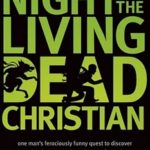Dead Man Walking
What is it with Christians and zombies?
 I was reading a blog the other day by a fairly-prominent pastor/pundit. He was talking about the events surrounding Jesus’ death and resurrection, it being Holy Week and all, and in one of the comments, someone referred to the mass resurrection that took place after Jesus expired as “the zombification of Jerusalem.”
I was reading a blog the other day by a fairly-prominent pastor/pundit. He was talking about the events surrounding Jesus’ death and resurrection, it being Holy Week and all, and in one of the comments, someone referred to the mass resurrection that took place after Jesus expired as “the zombification of Jerusalem.”
Now, having spent some time in Christian spec-fic circles, this wasn’t the first time I’d heard somebody make this sort of allusion to the walking dead. Ezekiel’s vision of the Valley of Dry Bones is another passage that always gets a few zombie shout-outs. It bothers me, because what’s happening in both these scenes is the exact opposite of zombification—this is God restoring life in its fullest sense to the dead, not animating corpses like a troupe of puppets on strings.
If anything, we’re the walking dead, before we meet Jesus. We have the appearance of life, but we’re spiritually empty. Maybe this is why the image has a peculiar magnetism for some Christians. It’s a metaphor of a life disconnected from God–a decaying corpse shambling around aimlessly, devoid of purpose or even comprehension of its debased existence.
And zombies are the most pathetic of the undead. They’re slow, stupid, and easy to dispatch. They shed body parts at random. They pose a threat only in large groups, or to the unwary, who probably deserve to become zombies themselves if they’re dimwitted enough to be caught by one.
Christians have traditionally shied away from zombies in entertainment media because of their association with voodoo culture, but with the advent of science-fiction-oriented zombie stories driven by viruses, parasites, chemicals, radiation, or alien pixie dust, zombies are pretty much mainstream now. It helps that they’re funny to watch, at least when they aren’t gnawing on human flesh. I suppose there might be a cathartic release in fantasizing about knocking the block off that annoying neighbor up the street. Hey, she’s already dead! I’m doing her a favor!
Which brings me to my fundamental discomfort with the zombie image. Zombies are un-redeemable. You can’t restore a zombie to humanity. All you can do is kill the poor thing and put it out of its misery. You also have to lay on a substantial amount of mayhem to seal the deal—decapitation, incineration, acid bath, chopping into itty-bitty pieces, et cetera. In the process, we lose our sense of the body’s inherent sanctity, and for people who believe in the resurrection of the body, believe in a resurrected Savior who ascended bodily into heaven, and believe that human beings are created in God’s image, this is a problem.
I’m not trying to preach a “Christians shouldn’t watch zombie movies” sermon here, but I do think we need to be careful about how we interpret and apply the metaphors we borrow from literature, film, and other media, particularly when we’re trying to share our faith. I’m a firm believer in using popular culture as a jumping-off point for spiritual discussion, but…“the zombification of Jerusalem?”
Come on. That’s an idea worthy of a zombie.












































“If anything, we’re the walking dead, before we meet Jesus. We have the appearance of life, but we’re spiritually empty. Maybe this is why the image has a peculiar magnetism for some Christians. It’s a metaphor of a life disconnected from God–a decaying corpse shambling around aimlessly, devoid of purpose or even comprehension of its debased existence.”
Isn’t that the truth!
“Which brings me to my fundamental discomfort with the zombie image. Zombies are un-redeemable.”
Unless touched by God.
“Unless touched by God.” That was my thought also, Bob, though I think Fred was referring to popular zombie conceptions.
If a Christian wrote a “zombie redemption” novel, surely he would need to include not only allegorical references to Ezekiel’s famous Valley of Dry Bones, resurrected by God, and rebuttals to Gnostic distaste for material things, but the central Gospel message like this:
Unredeemed humans aren’t just sick or dying; they are dead already, walking corpses, of their own fault. Yet God, instead of blowing them away, hacking them into bits, exploding/nuking them, etc. — as we deserve — loves and resurrects us!
Yes, the word “unredeemable” applied strictly to the context in which we find zombies–story and film. I haven’t seen any wandering around the real world–yet. 🙂 In the popular legend, zombies can’t be rescued from being zombies, which is where the spiritual metaphor breaks down.
Interestingly, one exception that comes to mind is in the film “The Omega Man,” in which the hero’s blood, draining away at the end of the movie, provides the basis for a vaccine that offers hope of reversing the zombie plague. The symbolism there is obvious. There may be other examples, but the usual solution is the business end of a baseball bat or chainsaw.
…and, technically, the plague victims in The Omega Man behaved more like vampires than zombies, but I still liked the ending.
Fred, that’s very similar to the end of Ted Dekker’s White, third in the Circle Trilogy/Series. I haven’t seen that film, but do you know which of the two came first? 😀 (Trying to find out on my own, remembering when the novel released; perhaps Kaci Hill would know …)
The Omega Man came long before I Am Legend (the movie) and Ted Dekker’s book ‘White’. But both The Omega Man and I Am Legend are in part based on Richard Matheson’s brilliant but decidedly sombre novella – I Am Legend (from the early 1950s).
Why do Zombies have to be irredeemable? It’s not like we are talking about things that really exist- can’t fictional constructs be altered? It seems Vampires are transforming all the time, why not Zombies? Especially if we are coming from a biological cause for Zombie existence- why can’t there be a cure? This discussion reminds me of a poem I wrote where Zombies are the metaphor for the asocial destructiveness of our technological materialistic age: http://sanctumasylum.blogspot.com/2011/02/zombies.html
Redemption should always be a possibility, even for Zombies.
For the Christian: any human is theoretically redeemable. That’s God’s choice, not ours!
However, I must say that so far the whole “can a vampire be redeemed” question has not been handled well, if indeed one attributes the whole Twilight thing as a part of the conversation from the get-go.
I don’t think Twilight answered the question it posed. It derailed. I will say, those Pike books might have, in a way. Rather than ask if Sita is redeemable, Sita is Krishna’s vehicle of compassion. (It also works that she doesn’t have to kill her victims, and most of the time they don’t even know they’ve been fed from. That’s the biggest problem with redeeming vampires: to stay alive they must have blood.)
Of course you can do anything you want to with a fictional construct–again, I was speaking of zombies as they’ve traditionally been presented in literature and film: dead bodies animated and controlled by some outside (usually malevolent) agency. You can’t reclaim them as human because they’re dead. They’re meat puppets. All you can do is stop them. As to spiritual redemption in the sense of salvation, that’s God’s province, as Stephen noted, and I would think that would depend on the state of the individual’s soul before they became a zombie (died).
Now, you can jigger the definition of zombie to mean a person who moves around mindlessly but is only “mostly dead,” but that’s a different issue. Resurrecting a human being isn’t the same thing as making a corpse move around.
I agree that Bernie from Weekend at Bernie’s and Wesley from the Princess Bride were not zombies. And Audio Adrenaline turns the zombie concept upside down with “Some Kind of Zombie”- being dead to sin, and puppets of the Holy Spirit? And since being born of the Spirit is what makes us truly alive that spin on it doesn’t work well for me. But the idea that without Christ we are already dead- even though we can seem alive, moving, breathing, and eating food not brains… They are dead and they don’t even know it. The Zombie concept seems very fitting. And you can say that God chooses who is saved, not us, but according to scripture I feel very confident in saying that God desires for all to be redeemed- the Spirit is fighting for all our lives and the only actual choice in the matter lies with the zombie. To choose Christ, or not to choose Christ. To be made new, or to remain dead- the choice is ours or else on Judgment Day there would be nothing to judge- if it were all predetermined by God in the beginning then there is no choice = no sin = no judgment for the choices we’ve made because we didn’t really make them.
How come the ol’ Predestination Paradox keeps coming up? 😀 I’m not saying I object, just wondering … it seems a perennial topic everywhere I go.
At the very least, the passage I cited leans on the God’s Sovereignty side of the debate, whilst others emphasize the Man’s Responsibility side. All Christians ought to agree that man is saved by grace through faith, not of works (as Ephesians 2 goes on to say). With that in mind, perhaps the main question over which Christians disagree is this: Is faith in Christ a work, which God initiates to grants the sinner? Or is faith something the sinner must come up with first?
Back on topic: it would seem that notwithstanding what the overall thrust of Scripture is on the issue, the best kind of story would be one about zombies who won’t choose anything but death, who can’t save themselves — not because they don’t have Free Will but because their free-will choice is limited by their natures: they want to stay dead. So they must be redeemed by an outside Hero who is truly the hero by bringing dead flesh back to life.
My answer, Stephen, would be that faith isn’t a work at all. It’s faith — decidedly different from work.
Now if you said, Does man generate his faith or does God? then I would say, Yes. 😉
Becky
I know someone who does believe that faith is a work–the prerequisite to salvation.
the best kind of story would be one about zombies who won’t choose anything but death, who can’t save themselves — not because they don’t have Free Will but because their free-will choice is limited by their natures: they want to stay dead.
At the risk of picking a fight (yeah, I know, and I promise to behave), this begs the question oft asked: Why would they want to stay dead? They wouldn’t, in fact, unless something greater (at least from their perspective) presented itself. If you want X more than you want Y, it doesn’t matter how good Y is or how bad X is in the end. It’s not that they want to be dead; it’s that they want something they don’t think they can have if they are alive.
Okay, fight picked. Not really, I don’t want one. 0=)
So they must be redeemed by an outside Hero who is truly the hero by bringing dead flesh back to life.
That’s the funny part, I think. Regardless which side of the “paradox” (which I don’t think it is) you fall on, most don’t argue that Man needs a Savior. Absolutely nothing we try on our own is going to save us, and anything we try is, in fact, more likely to compound the problem.
Okay, I’ll be quiet now. I really shouldn’t have gotten into that.
Sounds like a great story, Stephen; a lot like the world we live in today, but with a graphically visible display of the inner man. While they were yet zombies, there was one Hero determined to save them from themselves. Coming soon to a bookstore near you. 😉
“How come the ol’ Predestination Paradox keeps coming up?”
Because it’s a zombie. No matter how many times you bury it, it always comes back.
“…not because they don’t have Free Will but because their free-will choice is limited by their natures…”
But…zombies, by definition, don’t have wills anymore and can’t choose anything, because they’re *dead.* If they get another chance at salvation after they die, would that make them universalists?
Eek. It was so much easier when we just needed a good baseball bat.
In this case the zombie would be an Allegory for spiritual death, from which Christ resurrects a sinner by removing the heart of stone and giving him a heart of flesh.
However, I hadn’t thought that pushing the Allegory too far would result in Hyper-Calvinism — i.e., man has no free will, as opposed to a free will but a dead heart and sinful nature (which will always, without God’s interference, result in rejection of God). So maybe Christians — “Calvinoids,” anyway — ought to avoid zombie Allegories … ?
I am wary of vampires because they must take life–human life, most of the time–to survive. That, and they just either a. creep me out or b. their fans creep me out
And with mostly dead, he’s still partly alive.
All dead, well, there’s only one thing to do: go through the pockets and look for loose change! (Sorry, but I can’t resist finishing a Princess Bride quote.)
On to the topic at hand ….
Hence my issues with the movie Serenity‘s handling of the Reavers (among other things). In Firefly, the Reavers are certainly gruesome and hostile. Even so, the episode “Bushwhacked” gave me the sense that these people were human; horribly disturbed, psychotic and/or criminally insane, but human nonetheless (a point Mal and Jayne would no doubt disagree with).
Then in the movie, we have a huge climatic scene where, even after the discovery of what made these people go crazy, hundreds of them are slaughtered. Granted, it was either their deaths or the crew of Serenity’s, but after all Whedon’s careful build-up to show how the big bad government hurt these people in pursuit of its greater good, I can’t help feel miffed that our hero’s response is to finish the job so they can achieve their version of the same goal. By the end of the movie, after seeing the bodies of these Reavers strewn everywhere without much concern from anyone, I’m not sure what difference it makes whether the crew completes their self-appointed mission or not. I should not stop now before I launch into a full-scale rant about the movie. To sum up, I tend to agree with Fred: dehumanizing a group of people so their deaths don’t “count” may work in cartoons, but is a problematic and dangerous path to travel in fiction.
Finally, I can’t let this comment go without pointing people to Jonathan Coulton’s song “Re: Your Brains,” or this YouTube video featuring the song and the cast of “The Office.” Chalk it up to something zombies are good for: laughs.
To quote a rather silly TV show that had its moments regardless: “Where there is life, there is hope.”
But that’s actually my problem with Undead. Being human-sized parasites, it’s very hard to make them sympathetic. Vampires must have blood. Zombies are…mindless. (It’s not even that I don’t think it counts; I just don’t care because of the presentation.)
As Fred said,
And zombies are the most pathetic of the undead. They’re slow, stupid, and easy to dispatch. They shed body parts at random. They pose a threat only in large groups, or to the unwary, who probably deserve to become zombies themselves if they’re dimwitted enough to be caught by one.
And Michelle,
To sum up, I tend to agree with Fred: dehumanizing a group of people so their deaths don’t “count” may work in cartoons, but is a problematic and dangerous path to travel in fiction.
I saw Serenity…It didn’t live up to the hype as far as I was concerned.
Fred says,But…zombies, by definition, don’t have wills anymore and can’t choose anything, because they’re *dead.* If they get another chance at salvation after they die, would that make them universalists?
Eek. It was so much easier when we just needed a good baseball bat.
The irony is I probably would actually like a zombie movie that asked questions like that and really wrestled with the subject. As it is, every (not that I’ve seen more than a couple) zombie movie I’ve seen makes me want to pull my hair out. Is the only option to run around like lemmings and start bludgeoning when backed into a corner? Really?
End rant. 😛 Realize my experience is based on Shawn of the Dead and the Mummy movies.